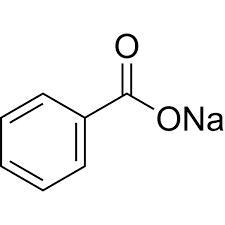HI! I’M ELEMENT AI.
Sodium Benzoate

Product Description
Sodium benzoate is a widely used food preservative and chemical additive with various industrial applications.
Product:
Sodium Benzoate
CAS:
532-32-1
Synonym:
Benzoic acid sodium salt
Structure:

Typical Characteristics
Appearance
White crystalline powder
Boiling point
>450 °C (decomposes)
Density
1.44 g/cm3
Melting point
>300 °C
Molecular Weight
144.10
Odor
Odorless
Purity
99%
Uses, Applications & Markets
Key applications
get a quote
We Offer Sodium Benzoate
in various grades
A few of the grades available are listed below:



Sodium Benzoate used in many
industry applications
Sodium benzoate is a widely used food preservative and chemical additive with various industrial applications. Here are some of its uses:
- Food Preservation: Sodium benzoate is commonly used as a preservative in the food and beverage industry. It helps prevent the growth of bacteria, yeast, and molds in acidic products such as soft drinks, fruit juices, pickles, and salad dressings. Sodium benzoate is effective at extending the shelf life of packaged foods and maintaining their quality.
- Pharmaceuticals: Sodium benzoate is utilized in pharmaceutical formulations as a preservative and antimicrobial agent. It is added to oral medications, liquid syrups, and topical creams to inhibit microbial growth and prevent contamination. Sodium benzoate helps maintain the stability and safety of pharmaceutical products during storage and use.
- Personal Care Products: Sodium benzoate is used in the formulation of cosmetics, skincare products, and personal care items. It may be added to shampoos, lotions, creams, and oral care products as a preservative to prevent microbial spoilage. Sodium benzoate helps ensure the safety and shelf stability of cosmetic formulations.
- Industrial Applications: Sodium benzoate finds various industrial applications beyond the food and pharmaceutical sectors. It is used as a corrosion inhibitor in metalworking fluids, lubricants, and hydraulic fluids to protect metal surfaces from rust and oxidation. Sodium benzoate may also be used in textile processing, water treatment, and chemical synthesis.
- Chemical Synthesis: Sodium benzoate serves as a precursor or intermediate in the synthesis of various organic compounds. It can undergo chemical reactions to produce benzene derivatives, aromatic compounds, and specialty chemicals. Sodium benzoate is used in the manufacture of dyes, perfumes, plastics, and agricultural chemicals.
- Photography: Sodium benzoate has historical uses in certain photographic processes, although its use has declined with the advent of digital photography. It was once used as a preservative and fungicide in photographic developer solutions to prevent microbial contamination and extend shelf life. Sodium benzoate-based developers were commonly used in traditional darkroom techniques.
- Water Treatment: Sodium benzoate can be used in water treatment processes as a corrosion inhibitor and scale inhibitor. It helps protect metal pipes, boilers, and cooling systems from corrosion and scale formation by forming a protective film on metal surfaces. Sodium benzoate may also be used in industrial cooling towers and heating systems.
- Fire Retardants: Sodium benzoate is sometimes used as a flame retardant additive in certain materials and products. It can help reduce the flammability and fire spread of textiles, plastics, and building materials. Sodium benzoate-based flame retardants are used in applications where fire safety is a critical concern.
- Antifreeze: Sodium benzoate can be used as an additive in automotive antifreeze formulations to inhibit corrosion and prevent rust in cooling systems. It helps protect metal components such as radiators, water pumps, and engine blocks from damage caused by freezing temperatures and coolant degradation. Sodium benzoate-based antifreeze solutions provide freeze protection and thermal stability.
- Biotechnology: Sodium benzoate is used in biotechnological research and applications as a selective agent and antimicrobial agent. It may be added to cell culture media and microbiological growth media to inhibit the growth of unwanted microorganisms while supporting the growth of desired cell lines or cultures.